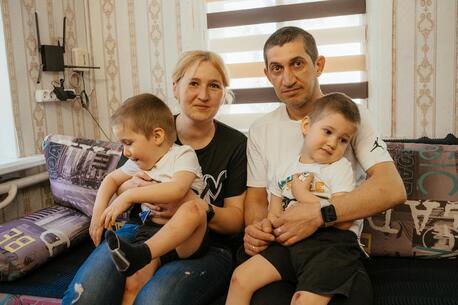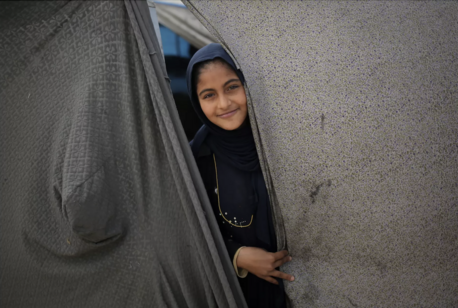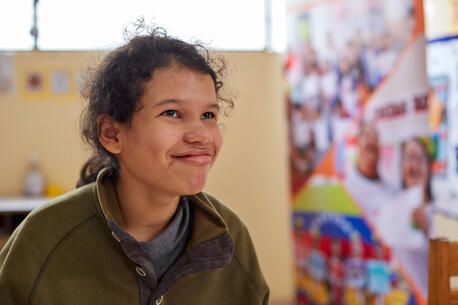Champion for Children with Disabilities Spreads Message of Inclusion
Lucy Meyer, who has cerebral palsy, is an advocate for children with disabilities. She is also a five-time Special Olympics gold medalist in swimming. Having recently graduated from high school, Lucy is taking a gap year to focus on her advocacy work. Her key message: acceptance plus inclusion leads to progress. In early November, Lucy traveled to Montenegro and Kosovo, where she visited with many children who are benefiting from UNICEF's programs in both countries. Some highlights:
Montenegro
After a game of indoor soccer, Lucy shares a moment with Special Olympics athletes in Montenegro. Children with disabilities "shouldn't be treated any different, because they are not different," Lucy tweeted afterward. "They just have trouble sometimes, doing certain things. So they should get help. People should help them so they can overcome their challenges." © Dusko Miljanic for UNICEF Montenegro 2019

Lucy made many fast friends during her visit to Montenegro's Center for Autism, Developmental Disabilities and Child Psychiatry. UNICEF and Special Olympics are working with local partners in Montenegro to advance early identification of intellectual disabilities and to support inclusion programs for children. © Dusko Miljanic for UNICEF Montenegro 2019
Lucy did several interviews with local news media in both Montenegro and Kosovo as part of her efforts to raise awareness of what families, communities and local governments can do to protect the rights of children with disabilities — including the right to learn and play with their peers in a supportive environment. Above, Lucy speaks with a reporter from TV Vijesti at a Special Olympics training complex. © Dusko Miljanic for UNICEF Montenegro 2019
Lucy gets a warm welcome from a boy at a care center for children with disabilities in Bijelo Polje, a city in northern Montenegro. Lucy, who has cerebral palsy, often thanks her parents for giving her opportunities to grow and thrive from a young age. She attended public schools in Los Angeles, where she grew up, and is a fierce advocate of inclusive classrooms. "I don’t want parents to fear for their children when they go to school just because their child has a disability," Lucy tweeted. "I want all schools to be inclusive and accepting." © Dusko Miljanic for UNICEF Montenegro 2019
UNICEF country offices work with local governments to ensure that children of all abilities have equal opportunities to learn — and that schools and teachers are well-equipped to provide those opportunities. Above, Lucy is swarmed by a group of kindergarteners at an inclusive school in the northern settlement of Pruska, where Special Olympics runs the UNICEF-supported Young Athletes program for kids ages 2 to 7. © Dusko Miljanic for UNICEF Montenegro 2019
Lucy gets a hug during a break from playing table tennis with kids who are part of a Unified Sports program launched by Special Olympics with UNICEF support. The program is specifically designed to provide opportunities for children with and without disabilities to play together. © Dusko Miljanic for UNICEF Montenegro 2019
Kosovo
At the Mihal Grameno school in Kosovo, children treated Lucy to a special dance performance and a fun day of sports and games. The school frequently welcomes children with disabilities for special events organized by Special Olympics Kosovo. © Adnan Beqiri for UNICEF Kosovo 2019
Murat Sahin, Head of Office for UNICEF Kosovo, shows Lucy a painting he received from local partner HandiKos at the HandiKos center in Pristina, where kids with disabilities can get physical therapy, psychotherapy and other services. The center also provides families with an opportunity to network and build a personal support system. In Balkan culture, it is common to keep children with disabilities at home and apart, which can be isolating. The painting's theme of equality matches UNICEF's approach to protecting children's rights and advancing opportunities for young people around the world. © Arben Llapashtica for UNICEF Kosovo

Lucy, seated at right, middle, learns about the achievements of several social entrepreneurs based in Kosovo who received support through UP-Shift — a part of UNICEF's Generation Unlimited initiative that is focused on empowering young people and readying them for the work force. Eglantinë Avdiu, standing at left, describes how sales of her group's 3D-printed jewelry and accessories are helping to support a local center for children with Down syndrome. Several members of Avdiu's team also have Down syndrome. UP-Shift started in Kosovo and has since been replicated in 21 other countries where UNICEF works. © Arben Llapashtica for UNICEF Kosovo
Top photo: Lucy Meyer, a spokesperson for the UNICEF-Special Olympics partnership, joined an art class while visiting children at Sutjeska primary school in Podgorica, Montenegro as part of her ongoing advocacy campaign on behalf of children with disabilities. UNICEF works with partners to support inclusive education so that all children have opportunities to learn and grow. © Dusko Miljanic for UNICEF Montenegro 2019
HOW TO HELP
There are many ways to make a difference
War, famine, poverty, natural disasters — threats to the world's children keep coming. But UNICEF won't stop working to keep children healthy and safe.
UNICEF works in over 190 countries and territories — more places than any other children's organization. UNICEF has the world's largest humanitarian warehouse and, when disaster strikes, can get supplies almost anywhere within 72 hours. Constantly innovating, always advocating for a better world for children, UNICEF works to ensure that every child can grow up healthy, educated, protected and respected.
Would you like to help give all children the opportunity to reach their full potential? There are many ways to get involved.





